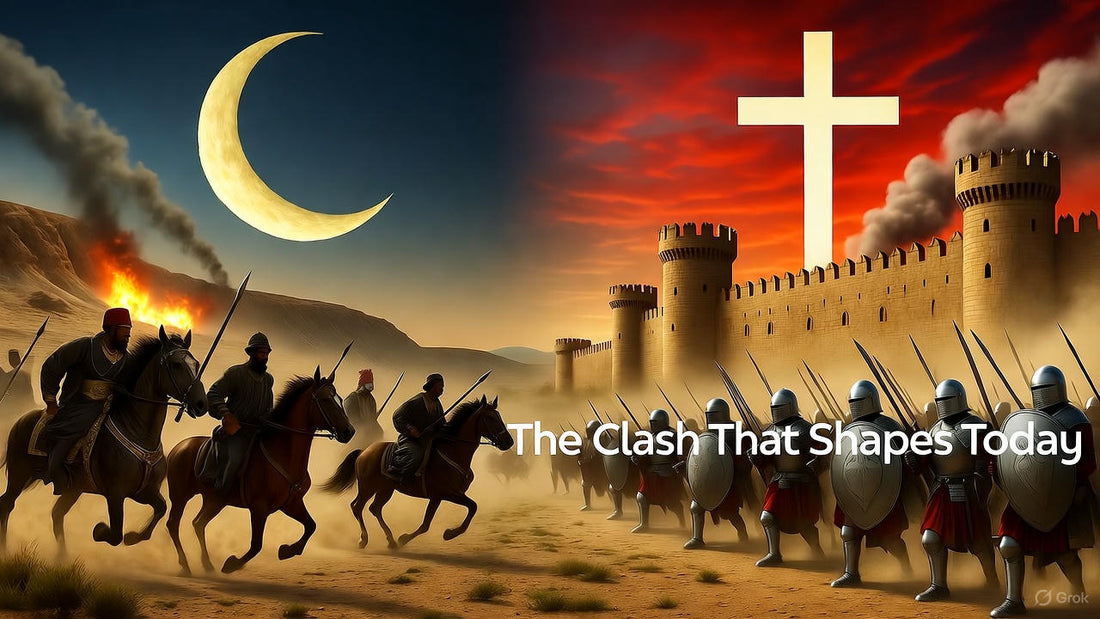
Nigerian Genocide: Christian Persecution and the Call for a Modern Crusade
Share
Echoes of the Crescent: A Call for a Modern Crusade to Halt the Genocide of Christians in Nigeria and Egypt
In the shadow of ancient minarets and crumbling cathedrals, history whispers a warning. Over a millennium ago, the swift rise of Arab caliphates—fueled by the fervor of jihad—swept across the Byzantine Empire, North Africa, and into the heart of Europe, toppling Christian strongholds and igniting the First Crusade. Today, in the sweltering heartlands of Nigeria and the Nile Valley of Egypt, a similar shadow falls: systematic violence against Christian communities, often branded as jihadist retribution or ethnic cleansing, threatens to erase ancient faith from its birthplace. As of October 2025, reports paint a grim picture—thousands slaughtered, churches razed, and millions displaced in what many experts now term a "silent genocide." This is no relic of the past; it is a clarion call for the West and the global Christian world to mount a modern crusade—not one of blind swords, but of unyielding moral resolve, diplomatic steel, and, if necessary, protective force—to defend the faithful and reclaim humanity's shared covenant against atrocity.
Drawing from the annals of Islamic expansion that birthed the original Crusades and the urgent pleas for intervention in today's crises, this article lays bare the argument: inaction betrays not just Christians in peril, but the very principles of justice that once rallied knights to Jerusalem. A crusade today would echo Pope Urban II's sermon at Clermont in 1095, transforming outrage into organized salvation.
The Historical Spark: When the Crescent Clashed with the Cross
The story begins in 632 CE, with the death of Prophet Muhammad. What followed was no mere succession crisis but a torrent of conquest under the Rashidun Caliphate. Abu Bakr, the first caliph, invoked jihad—holy struggle against unbelievers—to unify fractious tribes, crushing apostates and then hurling armies at the weary Byzantine and Sassanian empires. Victories at al-Qādisiyyah and Yarmouk in 636 shattered these superpowers, opening Syria, Egypt, and beyond to Arab occupation. Local Christians, chafing under Byzantine taxes and persecution, sometimes welcomed the invaders as liberators—yet Jerusalem's fall in 637 was decried as the "abomination of desolation" by its weeping patriarch.
The Umayyad dynasty carried the flame westward, seizing Iberia in 711 and raiding as far as Tours in 732, where Charles Martel's Frankish shield-wall halted their advance. In the east, Abbasid and Fatimid caliphates probed Byzantine borders, while the Seljuk Turks' triumph at Manzikert in 1071 gutted Anatolia, paving the way for Turkish warlords to menace Constantinople itself. Seljuk seizures of Jerusalem in 1071, coupled with Fatimid desecrations like the 1009 razing of the Church of the Holy Sepulchre, turned pilgrimage into peril and galvanized the West.
Theological fires burned on both sides. Islam's jihad promised martyrdom's reward; Christianity's just war doctrine, forged by Augustine, justified defensive violence for peace. Pope Urban II fused these into crusade ideology at Clermont: knights who "took the cross" earned sin's forgiveness, channeling Europe's martial zeal eastward. The result? Jerusalem's bloody recapture in 1099, Latin kingdoms in the Levant, and two centuries of holy war. Historians debate who "struck first"—Muslim chronicles hail liberation, Christian ones decry invasion—but the lesson endures: unchecked expansion breeds existential threats, demanding unified response.
Fast-forward to 2025, and the parallels sting. In Nigeria and Egypt, jihadist echoes—Fulani militias, Islamist extremists—target Christians not as collateral in ethnic squabbles, but as infidels in a perceived holy contest. The First Crusade arose from desperation; today's must from deliberate duty.
The Nigerian Inferno: A Genocide by Attrition
Nigeria's Middle Belt is a crucible of faith and fury. Since 2000, up to 62,000 Christians have fallen to Islamist blades, per Genocide Watch—many in coordinated raids by Fulani jihadists and Boko Haram. In 2025 alone, over 7,000 were killed in the first 220 days, a pace of slaughter that defies coincidence. June's Yelwata massacre in Benue State claimed 200 souls in a single dawn assault, while Plateau State's villages echoed with gunfire during Holy Week, leaving dozens more in unmarked graves. The 2004 Yelwa carnage, where 700 perished in interfaith reprisals, was no anomaly; it's a blueprint.
Critics decry the "genocide" label as reductive, citing land disputes, climate woes, and herder-farmer clashes. Yet the pattern screams intent: Sunday services bombed, like the 2022 Owo church attack killing 50; villages torched mid-prayer; IDPs numbering in millions, mostly Christian, herded into camps without recourse. Nigeria's government, riddled with complicity and corruption, prosecutes few, while security forces stand idle—or worse. As one survivor in Riyom declared, "This is terrorism. This is genocide—plain and simple."
This is the modern Yarmouk: not cavalry charges, but AK-47s and machetes, eroding Christian heartlands. Without intervention, Nigeria's 3 million believers under siege risk erasure.
The Egyptian Stranglehold: Systemic Strangulation of the Copts
Across the Mediterranean, Egypt's Copts—descendants of the pharaohs' scribes and Christianity's earliest converts—endure a slower venom: discrimination laced with sporadic savagery. Once 20% of the population, they now hover at 10%, fleeing a regime of blocked churches, blasphemy laws, and mob fury. In April 2024, extremists torched Coptic homes in Minya over a church-building bid; 2025 brought no respite, with surges in violence prompting Genocide Watch alerts.
February saw two Christians freed after three years on trumped-up charges, but others languish: blasphemy convictions spike, homes razed in "retaliatory" arson. The 2013 constitutional protections ring hollow amid Islamist undercurrents, where even rumors of church bells ignite riots. This mirrors the Fatimid era's tolerant facade masking al-Ḥākim's 1009 desecrations—today's version is bureaucratic jihad, starving faith through permits denied and prosecutions skewed.
While not the mass graves of Nigeria, Egypt's attrition qualifies as ethnic cleansing's prelude: Copts warn of "surging violence," with biblical lands emptying as families emigrate. It's the Seljuk shockwave redux: incremental erosion demanding preemptive shield.
The Imperative: Why a Modern Crusade is Justified
History does not repeat, but it rhymes. The First Crusade was no imperial whim but a fusion of theology, politics, and survival—much as today's must be. Morally, it's Augustine's just war reborn: defending the innocent against "accursed" aggressors, as Urban II thundered. Legally, the UN's Responsibility to Protect (R2P) mandates action when states fail, as in Nigeria and Egypt—precedents from Rwanda to Kosovo beckon Canada, the EU, and the US to lead.
Strategically, instability in Africa's powerhouse (Nigeria) and the Arab world's linchpin (Egypt) ripples: refugee floods, terror exports, economic tremors. A crusade bolsters Western credibility in the Global South, countering "neo-colonial" barbs with partnership—diplomacy first, force as last resort. Domestically, diaspora cries and figures like Canada's Andrew Scheer amplify the drumbeat: silence forfeits moral high ground.
Counterarguments falter. "Complex conflicts," not genocide? The targeting—churches, Sundays, crosses—betrays religious animus. Neo-colonialism? True intervention honors sovereignty while enforcing universal rights. Resources tight? Start small: resolutions, not invasions.
| Proposed Crusade Actions | Description | Risks & Mitigations |
|---|---|---|
| Diplomatic Onslaught | UN resolutions condemning attacks; fact-finding missions in hotspots. | Veto threats—rally G7, AU allies. |
| Sanctions Sword | Target militants, complicit officials, arms flows. | Nigerian backlash—coordinate with ECOWAS for legitimacy. |
| Protective Vanguard | UN/AU peacekeepers in Christian enclaves; IDP safe zones. | Escalation—clear ROE, local buy-in. |
| Aid Arsenal | Fund camps, early-warning tech, church rebuilds. | Aid diversion—monitor via NGOs. |
| Justice Reckoning | ICC probes; asylum corridors for persecuted. | Sovereignty clashes—frame as universal jurisdiction. |
| Faith Coalition | Mobilize global Christians: petitions, boycotts, volunteer surges. | Polarization—emphasize defense, not conquest. |
This "menu" escalates prudently, blending Urban's penitential zeal with modern multilateralism.
A New Deus Vult: The Path Forward
Imagine Plateau's dawn spared by drone sentinels, Minya's Copts praying unmolested under international gaze. That's no fantasy—it's a crusade's promise. As the Seljuks once threatened Byzantium's gates, so do today's jihadists imperil Africa's and the Middle East's Christian remnant. The world that birthed the First Crusade must birth its heir: not vengeance, but vigilance; not empire, but emancipation.
To parliaments in Ottawa, Washington, and Brussels; to pulpits from Rome to Lagos: heed the cry. Recognize these atrocities as crimes against humanity. Fund the fight. Deploy the defenders. For in saving Nigeria's and Egypt's faithful, we save the soul of a world that once shouted Deus vult—God wills it. Today, He wills justice. Will we?
